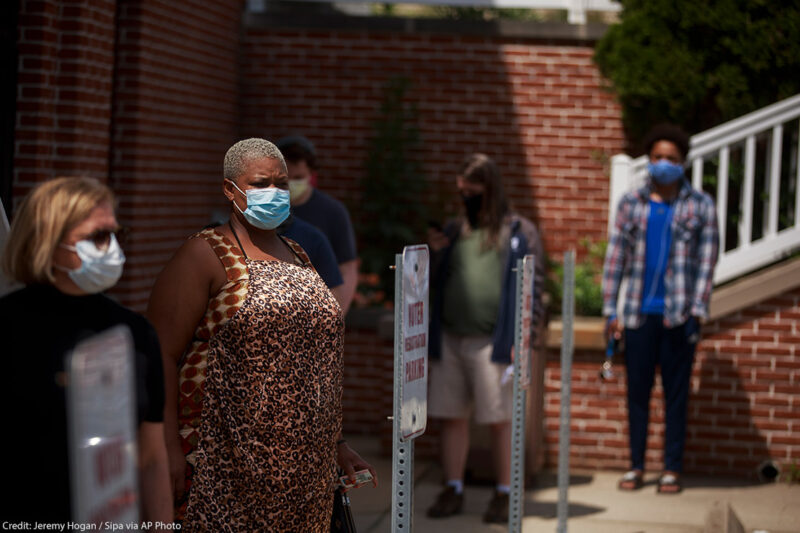Lives are at Stake. Will Congress Act?


As COVID-19 infection rates soar across the country, Congress is running out of time to take further actions to protect us all. Our government must do more: Lives are at stake. Black and Brown communities are dying and being hospitalized at disproportionate rates, yet Congress continues to drag its feet on a meaningful relief package that protects the health and future of our country.
It doesn’t have to be this way. Congress can act to prevent further tragedy, and it must. The ACLU urges the Senate to take four key actions to protect marginalized communities and the most vulnerable people in our country:
- Mandate and provide funding for no-excuse absentee mail-in voting and early voting;
- Expand early release for people in prisons and jails most vulnerable to COVID-19;
- Provide funding for emergency rental assistance; and
- Provide access to COVID-19 testing and treatment for everyone, regardless of immigration status.
These actions will save lives, prevent homelessness and broader economic devastation, and allow people to exercise their right to vote without sacrificing their health.
Protect our Health and our Democracy
Congress must set national standards for the 2020 elections so that no-excuse mail-in absentee voting and early voting are available to all voters. Expanding access to early voting and vote by mail will let voters avoid physical polling locations and minimize person-to-person contact, reducing their risk of contracting COVID-19 while voting. Without action, the problems we saw during the chaotic primaries in Georgia, Florida, Texas, and Wisconsin could repeat themselves on a national scale. Additionally, failing to expand mail-in voting and to provide safe in-person voting options would disenfranchise the very communities of color who have faced the worst forms of voter suppression and systemic racism throughout American history. Though officials from both parties have taken steps to expand voting access during the pandemic, Congress must mandate expanded voting access through the . Without a national framework guiding states and funding to actualize it, patchwork solutions will disenfranchise eligible voters and could increase COVID-19 infections.
Expand Early Release
It is also crucial for Congress to release those most vulnerable to COVID-19 from our nation’s prisons and jails. Despite expanded authority to reduce the federal prison population provided by the CARES Act, only of the 150,000 people in Federal Bureau of Prisons (BOP) custody have been placed in home confinement since April. This inaction continues despite deaths and over 8,000 confirmed cases of COVID-19 among incarcerated people and staff at BOP facilities. Over half of all 122 federal prisons have been impacted by the virus. Congress can fix this easily by in the next relief package, which would move pregnant people, those age 50 and older, and those with underlying health conditions in BOP custody into home confinement and other community supervision programs.
Emergency Rental Assistance
Even before the pandemic, 8 million households of America’s lowest-income renters struggled to pay rent. The situation is now far more dire: With lost income, reduced wages, and lost jobs, many are facing homelessness and eviction — both of which put people at even greater risk of infection. On average, Black women renters had evictions filed against them by landlords at double the rate of white renters in 17 out of 36 states, according to a study by the ACLU’s Womens’ Rights Project and Data Analytics team. By providing $100 billion in emergency rental assistance, Congress can prevent a wave of mass evictions that would throw millions into homelessness and could make our country more vulnerable to disease.
Universal Access to Testing and Treatment
Finally, while infection rates are spiking nationwide, Congress failed to include tens of millions of people in access to testing and treatment — many of whom are essential workers, including immigrants. There are approximately “essential” immigrant workers, risking their lives under the constant threat of exposure. Leaving so many green card holders, DACA recipients, Temporary Protected Status holders, and other immigrants out of testing and treatment is cruel, inhumane, and flies in the face of public health experts’ . Additionally, nearly believe that the federal government has an obligation to provide medical care to undocumented immigrants with COVID-19. Testing and treatment are essential to curbing the spread of COVID-19 — and until all of us are covered, all of us are at risk. Under the current circumstances, people are left to seek care at local community health centers — some of which do not have COVID-19 testing or are — or to hope that their state will provide testing and treatment to those not covered by Congress’ relief packages. But these options are limited and lead to confusion about whether people are eligible for care or where to go to receive it. Congress must ensure that COVID-19 related care is available under emergency Medicaid in order to protect us all.
The time to act is now: lives are on the line. Members of Congress, do your job.

